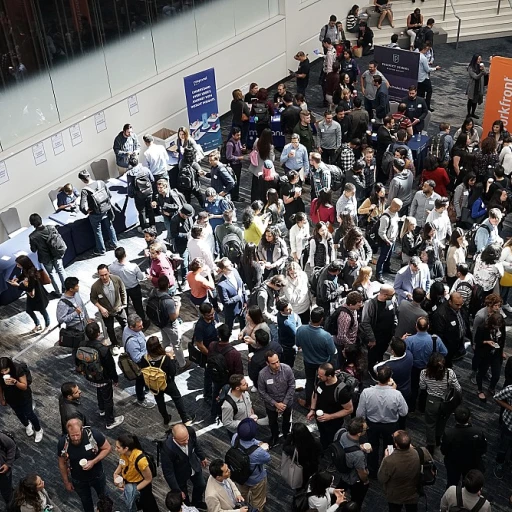
The Role of AI in Designing Engagement Activities
Leveraging Technology to Craft Meaningful Engagement Activities
In today's dynamic work environment, creating an engaging culture is more crucial than ever. Artificial intelligence (AI) plays a vital role in crafting innovative engagement activities that can transform the mundane office atmosphere into a hub of excitement and innovation. AI tools are fundamentally changing how activities are designed, ensuring they resonate with employees and align with the company's culture.
AI can help generate personalized engagement activities that cater to diverse team members' interests and preferences. By analyzing data on employees' behavior and preferences, companies can organize office activities that employees find more enjoyable and relevant. This personalization makes employees feel valued and included, which directly impacts their morale and productivity.
- AI can recommend fun and innovative engagement ideas by learning from past activities' successes and failures.
- It can identify individuals or groups within the company who may benefit from specific team-building activities, ensuring everyone feels part of a cohesive team.
Moreover, AI systems can also automate tedious tasks involved in planning activities, thus allowing HR professionals to focus more on strategies that foster employee engagement. By removing these burdens, HR can shift their attention to creating a supportive work environment that encourages employees to be more engaged and productive.
Gamification in the Workplace
Integrating Game Mechanics in Workplace Culture
In recent times, the work environment has seen a dynamic shift with the introduction of gamification into the company culture. Gamification has emerged as an innovative tool that can invigorate employees and teams, breathing new life into engagement activities. By embedding fun elements into day-to-day tasks, employees feel a sense of accomplishment and recognition.
Embracing gamification can enhance engagement ideas by creating a workplace where employees are eager to participate. It encourages healthy competition, collaboration, and the achievement of goals. Companies are tasked with designing activities that resonate with team members and these concepts should align with the organization's overall objectives and culture.
- Team challenges: Engaging team building activities through challenges can boost employee morale. Simple team-based competitions can create a lively atmosphere of collaboration and camaraderie.
- Achievement systems: Recognition is vital. Companies can introduce achievement badges or point systems for tasks completed or goals met, fostering a culture of progress and growth.
- Interactive leaderboards: Display leaderboards to show progress, fostering healthy competition. It offers employees a transparent view of accomplishments, which can be motivating.
For inexpensive employee engagement ideas, companies need not go overboard in terms of budget. Simple ideas like trivia sessions or themed work days can significantly impact without needing extensive resources.
Overall, implementing gamification not only creates fun employee interactions but also enriches the workplace culture. As an evolving trend, AI-driven incentive compensation strategies can be explored to further boost employee motivation, offering personalized rewards tied to individual achievements.
Virtual Reality for Team Building
Transforming Team Dynamics with Virtual Reality
In an age where technology is constantly evolving, virtual reality (VR) has emerged as a groundbreaking tool to enhance employee engagement and team building. By providing immersive experiences, VR creates innovative engagement activities that immerse employees in scenarios they might not otherwise experience in their day-to-day work. This not only makes employees feel more connected to their roles but also enhances interpersonal relationships among team members.
VR is particularly effective for remote teams who might miss out on traditional in-person bonding opportunities. By using VR technology, companies can help employees participate in fun team building activities from anywhere in the world. These activities can range from virtual escape rooms to collaborative problem-solving challenges, fostering teamwork and communication.
These VR-enabled activities can be an inexpensive employee engagement idea that brings about a positive change in workplace culture. Virtual environments also offer the flexibility of incorporating company-specific themes, making the experience unique and personalized. For instance, a company could create a virtual scenario that mirrors real-life challenges employees might face, allowing them to collaborate and innovate together in a low-pressure environment.
Moreover, VR team building exercises promote mental health by encouraging employees to break away from their routine and engage in enjoyable, stress-relieving activities. These fun employee engagement activities not only make employees feel valued but also help maintain a healthy work-life balance.
As companies continue to embrace VR in their engagement strategies, it’s crucial to measure the impact on team performance and overall workplace culture. Through AI-powered feedback systems, businesses can easily gather insights into what works and continually refine their VR activities for maximum engagement. To delve deeper into how AI can enhance engagement activities, explore the insights provided by AIHR Institute on AI-powered feedback systems.
AI-Powered Feedback Systems
Implementing AI-Driven Feedback Mechanisms
Enhancing employee engagement requires creating a work environment where employees feel heard and valued. One effective way to achieve this is through the implementation of AI-powered feedback systems. These systems help both employees and employers by enabling real-time communication and feedback loops that are transformative for office dynamics. AI-driven feedback systems offer several benefits:- They provide employees with timely and constructive feedback, thereby helping them improve their performance and feel more engaged.
- These systems can help in recognizing patterns and suggesting personalized engagement activities that are well-aligned with the team’s needs.
- Incorporating AI into feedback mechanisms encourages employees to share their thoughts in a safe and anonymous manner, which in turn enhances openness and trust within the workplace.
Personalized Engagement Strategies
Strategies for Tailoring Engagement to Individual Preferences
One of the key benefits of utilizing artificial intelligence in employee engagement is the ability to personalize activities based on individual preferences. This level of personalization helps to ensure that employees feel valued and recognized for their unique contributions to the team.
AI technology can analyze an employee's interests, strengths, and past engagement patterns, allowing companies to create customized activities that resonate with each person. By offering a personalized engagement activity, such as an inexpensive team-building event or office-wide challenge tailored to the interests of team members, companies can foster a more inclusive work environment.
Moreover, personalized engagement strategies help to bridge the gap between work and personal interests. When employees feel that their personal passions are acknowledged and encouraged, they are more likely to be engaged employees. Incorporating an employee's personal hobbies into the workplace culture not only enhances employee morale but also strengthens the overall company culture.
- Offer a variety of engagement ideas to cater to diverse interests.
- Utilize feedback systems to continuously adapt and improve engagement offerings.
- Encourage a healthy work-life balance by incorporating mental health awareness into activities.
- Recognize individual achievements through tailored recognition programs.
By focusing on individual preferences and encouraging employees to bring their whole selves to work, organizations can boost employee satisfaction and foster a positive office environment. Personalized engagement not only helps employees feel valued and recognized but also contributes to building a supportive and dynamic workplace culture.
Measuring the Impact of Engagement Activities
Evaluating the Effectiveness of Engagement Initiatives
In the evolving landscape of workplace dynamics, it's crucial for companies to assess the impact of their engagement activities. Utilizing AI-powered feedback systems, detailed evaluations become more accessible, providing insights into how employees feel about their work environment and the office culture.
Employee engagement is more than just taking part in fun activities; it involves understanding their mental health and ensuring they feel valued. AI can analyze feedback from engagement activities to gauge employee morale and satisfaction, guiding further decisions.
Therefore, AI's role extends into measuring engagement activity outcomes. The use of data-driven insights helps companies refine their strategies, ensuring activities resonate well with every team member and help create a positive workplace culture. Regular assessment can significantly aid in nurturing an engaged and motivated team over time.
Organizing gamification and virtual reality team building events are good starting points. Still, without a follow-up on their results, the real value could be lost. Recognizing, analyzing, and adapting based on feedback encourages employees and reinforces a culture where team members and other employees feel heard and appreciated, promoting lasting engagement.













